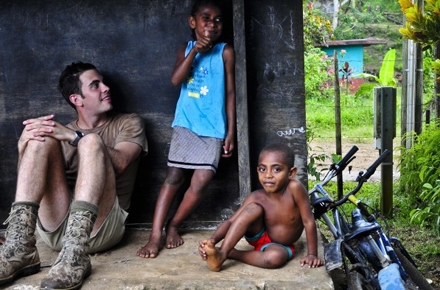Bucks and boats best for the Pacific
Australia needs to give more aid to the Pacific and provide greater opportunities for the region’s people, says a leading ANU scholar.
Professor Stewart Firth – a Pacific history and politics expert from the ANU College of Asia and the Pacific – says that the amount of aid Australia provides its neighbours is a “mere drop in the ocean of what is actually needed”.
“The Australian government has used AusAID as a vehicle for security and development, and to help build stability in the Pacific,” Firth told the inaugural State of the Pacific conference hosted by the College’s State, Society and Governance in Melanesia program.
“And whenever there is trouble in the Pacific, it has the effect of generating more aid; and there has definitely been a lot more of it since 2003.
“But, while we think we are giving an enormous amount in aid, we are not really. When you compare the massive transfer of resources from France and the United States to their Pacific territories, or what freely associated states like Palau receive, what we give is not so substantial.
“This shows you the difference metropolitan resources make to the lives of people in the Pacific.”
France gives $4 billion annually to its Pacific territories, including New Caledonia, which UNESCO estimates has an average household income of $37,000 per annum – much higher than many other Pacific states.
Earlier this year the Australian government announced that it was cutting aid spending, and would also delay a scale-up to 50 cents in every 100 dollars of government income going to foreign aid.
Firth also called on Australia to make a greater contribution to the region through partnerships that provided Pacific countries with real opportunities.
“In terms of policy, we don’t do things that would assist the Pacific most, such as maritime security,” he said.
“Joint maritime operations provide Pacific countries the ability to secure and conduct surveillance across their large exclusive economic zones. Australia could do more in the maintenance of maritime security across the region.
“We also need to provide more opportunities for labour mobility and make it easier for Pacific Islanders to work in Australia. If we are to truly embed economic integration across the region, we need to open up our labour markets.”
Australia hosted 1,400 seasonal workers from the Pacific last year, compared to New Zealand’s 8,000.
Failing to see the bigger picture
Professor Stewart Firth also used his keynote address to stress that policymakers, politicians and experts in Canberra had a tendency to view the Pacific in terms of deficits – or what it hasn’t got.
“They also talk about the Pacific in terms of failed states,” he said.
“But while there are a lot of challenges in the Pacific, there are no failed states in the true sense of the term.”
Instead of being a sea of sorrow, the Pacific was making progress in a range of areas, including strong economic development in Papua New Guinea and the Solomon Islands, and a mobile and Internet revolution which was connecting and empowering people across the region.
And according to Firth it is also time Australia stopped thinking it had all the solutions to the challenges faced by its neighbours.
“We approach the Pacific as if we know all the answers. This ignores the fact that in every Pacific country there is enormous and rigorous debate about what needs to be done in their own countries.
“The peace process in Bougainville is an example of this, as well as Tonga’s new constitution, which was the culmination of 20 years of political discussion.
“Let’s get away from the idea that the Pacific isn’t considering its own destiny.”
State of the Pacific runs at the ANU College of Asia and the Pacific from 25-26 June. It forms part of a four-day Pacific research event, Pacific Perspectives, which also incorporates the 2013 Pacific and PNG Update.







